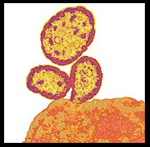
“We are looking at better ways to treat some of the most lethal cancers,” says Eva Galanis, M.D., oncologist and lead researcher on the glioblastoma multiforme project in the measles virus investigation.
“We have shown in the laboratory and in several animal models that measles virus strains can significantly shrink glioma tumors and prolong animal survival. It is very rewarding to see this work maturing to the point of now being able to offer this novel and promising treatment approach to patients with recurrent glioblastoma multiforme,” she adds.
The glioblastoma multiforme study has been designed to test the safety of the measles virus for the treatment of gliomas, and enable biological monitoring of anti-tumor activity.
“The measles virus we are using in the glioblastoma multiforme trial provides a noninvasive way to monitor viral effects in the tumor,” says Dr. Galanis.
“When the virus replicates, it produces a marker protein that we can detect in the blood using a clinically-available assay. Repeat brain tumor biopsies for this purpose are not always safe or ethically justified. Instead we can monitor viral propagation in the tumor with a blood test, allowing us to adjust the dosage to increase the likelihood of therapeutic benefit,” she adds.
The researchers say that one important condition for being eligible for the treatment would be that the patient must be immune to measles, either having had the disease or been vaccinated against it.
